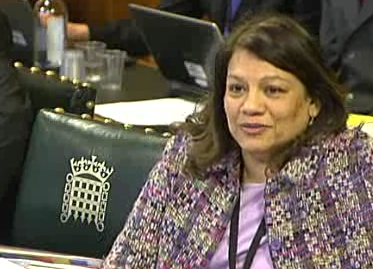- 03/02/2015
- Posted by: Valerie Vaz MP
- Category: News

On Tuesday 3 February 2015 the Health Select Committee, of which Valerie is a member, heard evidence as part of their inquiry into the impact of physical activity and diet on health. The Committee heard evidence from representatives from NICE, the Nuffield Department of Primary Health Care Sciences, Which?, the British Heart Foundation, and the UK Health Forum.
Valerie said:
“It is important that all schools encourage children to walk to school and have the use of playing fields. This can be further enhanced by school’s having walking clubs, ‘walk to school’ weeks and making sure students are proficient in cycling through in school training. I highlighted that there are at least two schools in Walsall South that do not have playing fields. Professor Wareham from the MRC Epidemiology Unit and Centre for Diet and Activity Research recent research told the Committee that everyone needs to just do 20 minutes extra exercise a day to live longer, and this can be broken up into 10 minute blocks. It is clear that more research is needed to fully understand why girls are not undertaking the same levels of exercise at school as boys.”
“Food plays an important role in an individual’s wellbeing. Front-of-pack labelling need to make it very clear to consumers how health the food is. This has already started to influence people’s decisions when shopping in supermarkets. Research has shown that the traffic-light labelling system is the clearest for consumers.”
“Other alternatives to public health education have been tried around the world. Mexico has put in place a 10% taxation on sugar-sweetened beverages giving rise to a 10% reduction. Taxes like this could be used to subside fruit and vegetables. I was also told that restaurants, public procurement and public institutions need to take the lead in providing healthier options to consumers when consumers are not cooking for themselves. Public Health England needs to pull together food and exercise in a simple public awareness campaign that incorporates the NICE guidelines. Professor Leng, the Director of Health and Social Care, and Professor Jebb, chair of the government’s Responsibility Deal food network, disagreed on the best way to encourage the reduction of sugar-beverage consumption. This focused around the commercial implication of taxing sugar-sweetened beverages. It later emerged that ten of Professor Jebb’s research projects had been funded by the sugar industry.”
“Pharmacies are involved in helping people to stop smoking , I know one which has had a 90% success rate. I asked if a similar model could be used to help people lose weight and get fit. I was told that there is an NHS exercise-on-referral scheme, but the results have not been as successful in this regard. The provision of a pedometer has shown to make people aware of their own level of physical activity and does promote beneficial change. This same process needs to start to motivate that person to adopt a new behaviour to become more active, changing their diet or thinking about losing weight.”
“I asked about a potential campaign for physical exercise to rival ‘five-a-day’. One suggestion was ‘Just Do More’.”
More information of the Health Select Committee’s inquiry into the impact of physical activity and diet on health is available here: http://www.parliament.uk/business/committees/committees-a-z/commons-select/health-committee/inquiries/parliament-2010/physical-activity-and-diet/

